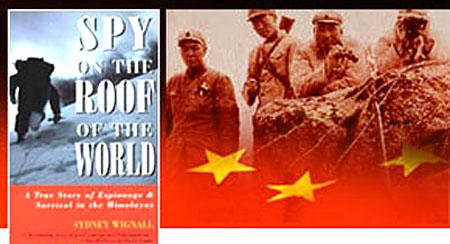
Sidney Wignall, a British mountaineer who spied on China for India in the 1950s, passed unnoticed into the ages this week.
We mourn this unsung hero by republishing Claude Arpi's 2002 feature.
Though it passed unnoticed in India, a very interesting book was published recently. This book should be read by all those interested in the strategic relations between India and China.
Spy on the Roof of the World (Penguin) is the true story of Sidney Wignall, a British mountaineer who, in 1955, went on a perilous expedition inside Tibet with the full knowledge and complicity of Indian Military Intelligence to check on the progress of the strategic road between Tibet and Xinjiang (Sinkiang).
Wignall gives us a lively account of how the Indian Army, including then army chief General K S Thimayya, already knew in 1955 that the Chinese were building a road across Indian territory.
Military Intelligence asked Wignall to get proof of the project. It was the only way to convince Jawaharlal Nehru how misconceived his Hindi-Chini Bhai Bhai policy was. Thimayya had been very suspicious of the Chinese who had declared they wanted to defend 'their western borders.'
One of the most distressing parts of this story is that when Wignall offered his manuscript to Indian publishers he was politely told they could not publish 'this stuff' in India. He had no other choice but to first publish the book in the UK.
While 'official' Indian history tells us that the building of the road was discovered in 1958 when an Indian patrol was arrested by the Chinese People's Liberation Army for trespassing on Indian territory, the matter only became public in 1959 when it was raised in the Lok Sabha.
If one accepts Wignall's version, which is corroborated by several other facts, the Government of India kept secret the occupation of a part of Jammu and Kashmir state for four/five years.
In 1959, in Parliament, Nehru first dismissed the whole affair thus -- why to 'fight for a few rocks'? Or for a place 'without a blade of grass?' But later he had to admit the blunder.
The road had already been inaugurated by Zhou Enlai in 1957; the Chinese media had widely broadcasted the event. On October 6, 1957, in an article in the magazine Kuang-ming Jih pan, the Chinese government announced: 'The Sinkiang-Tibet Highway -- the highest in the world -- has been completed. During the last few days a number of trucks running on a trial basis have arrived in the Ko-ta-ke in Tibet from Yehch'eng in Sinkiang.'
The article added 'two trucks fully loaded with Hami melons, apples, pomegranates, all natives products of Sinkiang, headed in the same direction. These fruits were gifts brought specially by the road builders of Sinkiang for the people of the various nationalities of Ko-ta-ke.'
One wonders who these nationalities were because except for some forced Tibetan labour and poor Han recruits, nobody was around. One also doubts if the toilers ever tasted the fruits of their hardship for building this crucial road link on the Aksai Chin plateau, but this is another story.
Wignall, after having discovered that a road was indeed being constructed in great secret, was caught by the PLA, interrogated and kept prisoner for several weeks. He was later released in the middle of winter in a high altitude pass.
The Chinese thought he would never survive the blizzards or find his way back to India.
After an incredible journey, he managed to reach the Uttar Pradesh border with Tibet and was able to report the construction work to the army who, in turn, informed Prime Minister Nehru and V K Krishna Menon, then defence minister.
However, at that time it was more convenient for the politicians not to believe a Britisher. He was later told by his army contact:
'Our illustrious Prime Minister Nehru, who is so busy on the world stage telling the rest of mankind how to live, has too little time to attend to the security of his own country. Your material was shown to Nehru by one of our senior officers, who plugged hard. He was criticised by Krishna Menon in Nehru's presence for 'lapping up American CIA agent-provocateur propaganda.' Menon has completely suppressed your information.
'So it was all for nothing?' I (Wignall) asked. 'Perhaps not,' Singh (Wignall's contact in the army) responded. 'We will keep working away at Nehru. Some day he must see the light, and realise the threat Communist Chinese occupation of Tibet poses for India.'
Indeed, it would take a few more years for the Indian prime minister to see the light. This sad incident is not complete without mentioning that Wignall's contact in Military Intelligence was killed at Sela Pass when the Chinese attacked India in 1962.
It also perhaps explains why, when Timmy, (as General Thimayya was known by his junior officers), was forced to retire in 1961, he declared in his valedictory address to the Indian Army officer corps 'I hope I am not leaving you as cannon fodder for the Chinese Communists.'








 © 2025
© 2025